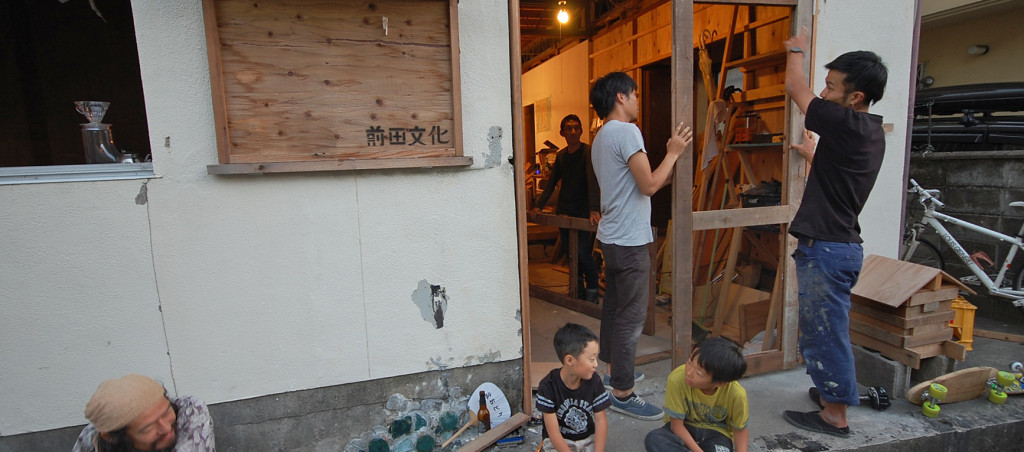
前田文化(まえだぶんか)
文化住宅を利用した様々な活用方法の提案と実践を行う。
取り残された文化住宅
1950〜60年代、関西では「文化住宅」と呼ばれる集合住宅が数多く建てられた。各部屋に専用の台所と便所を完備した集合住宅は画期的で、「文化的である(=豊かである)」という意味で文化住宅と呼ばれた。
50年が経った現在、当時「文化的」だった文化住宅は老朽化が進み、業者の手によって解体され、何の面白みも無い姿に変えられるか、空き部屋だらけの状態で放置されている。
更地になって駐車場になるまで
築数百年を超える京都の町家や、重要文化財に指定される奈良のお寺などとは違い、近所を探せばどこにでもある文化住宅は、そのままの状態でこれから何十年も残しておく必然性は無い。
前田文化は、近い将来、他人に土地ごと売り払われ、次の持ち主が更地にして駐車場にしてしまうのだろう。
それまでの残された時間、この場所が確かに持っていたはずのエネルギーに満ち溢れた風景を再現すること。それが文化住宅を昭和の時代から受け継いだ我々の使命であり、いつかは消えて無くなってしまう文化住宅にとっての最大の弔いとなる。
壊すでもなく、作るでもなく
特定の用途やシーンを限定せず、一般的な価値判断やモラルに囚われず、その日その場所で前田文化に関係を持った人間の趣味趣向に応じて活用方法を実践する。
娯楽、芸術、教育、スポーツ、文学、科学、大人、子供、老人、日本人、外国人、お金持ち、貧乏人、健康、病気、天国、地獄….
前田文化の活用方法は、あらゆる分野と領域を背景とし、何かを構築するわけでもなく破壊するわけでもない。興味の対象は、移り変わる季節や天気のように変化し、毎週日曜日に行われる行為の積み重ねが、やがて文脈となり文化となる。
Maedabunka
To propose and implement various ways of usage of “Cultural-Housing.”
Stranded “Cultural-Housing”
In 1950s and 60s, many multiunit apartment buildings call “bunka-jyutaku” were build in Kansai region. Each room in the apartment completed with a kitchen and a toilet which was revolutionary at that time, therefore it was described as “Cultural-Housing”. Cultural means “Bunka” and housing is “Jyutaku”, so those buildings were named “Bunka-Jyutaku (文化住宅)”
Some of those Bunka-Jyutaku used to be “cultural” are now dilapidated and dismantled by architectural wreckers after half a century had passed. It would change a form to innocuousness or others are neglected without any residents.
Until becoming a Vacant lot to Parking lot
Cultural Housings are everywhere if you look around the neighborhood, there is no necessity of conserving them for another decades. Because those Cultural housings are not important cultural properties like hundreds years old townhouses in Kyoto or buddhist temples in Nara.
In the near future Maedabunka will be sold off and the next owner will dismantle the building to a vacant lot and it will end up a parking lot.
Until then, to reconstruct the vibrant scene of delight energy the place used to have. That is the mission for us who inherited “Cultural-Housing” from Showa period, also we think it would be a greatest console.
Neither Breaking nor Making
Without limiting particular use or scene, think beyond the general judgment of values or morals we practice the use of Maedabunka depending on interests and tastes of people gather at Maedabunka day by day.
entertainment, art, education, sports, literature, science, grownups, children, elderlies, Japanese, foreigners, rich, poor, health, sickness, heaven and hell……
Manner of utilization of Maedabunka is neither breaking nor making in every field and area. Our interests shift as changeable as the weather, stacks of acts of every Sunday will become context and eventually a culture.

